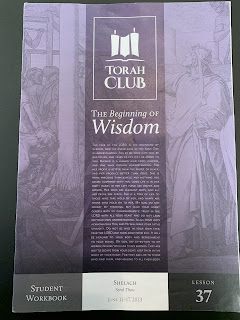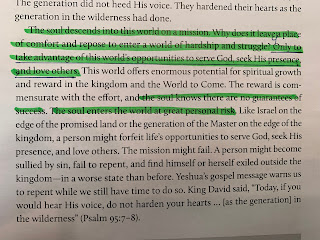I'll admit, I've been sucked toward the rabbit hole of politics more in 2020 than any year since my youthful fascination decades ago. With so much of consequence happening, between the pandemic, race relations, and the election, I can't be alone in this. At the same time, the ongoing Culture War and hyper-partisanship have made our political theatre more and more toxic to those who both participate in it, and to those who observe it.
Perspective is lacking. We need to refocus, particularly as Christians, on 'things above', {Colossians 3:1 (NIV) Since, then, you have been raised with Christ, set your hearts on things above, where Christ is, seated at the right hand of God.} but how do we do that? By putting politics back in its rightful, secondary, place.
1. God directs history, not man - Psalm 2
Psalm 2:1-6 (NIV)
1 Why do the nations conspire
and the peoples plot in vain?
2 The kings of the earth rise up
and the rulers band together
against the Lord and against his anointed, saying,
3 “Let us break their chains
and throw off their shackles.”
4 The One enthroned in heaven laughs;
the Lord scoffs at them.
5 He rebukes them in his anger
and terrifies them in his wrath, saying,
6 “I have installed my king
on Zion, my holy mountain.”
The thing is, as impactful as human decisions and choices are in our own lives, and as important as our collective decisions are for the future of our nation and culture, God is still in control, both individually and collectively. The will of God is not gainsaid by anything that human beings do, or fail to do. The ultimate example of the futility of striving against God is the 'victory' of Satan when Jesus Christ was betrayed, falsely convicted, sentenced to death, and horribly murdered on a cross. This apparent defeat of God's champion, whether Satan knew him to truly be the Son of God or not, was not a derailment of God's purpose in sending the Messiah, but its fulfillment. In 'defeat', God was victorious in establishing his will, destroying both Sin and Death through the resurrection of Jesus. Because God was able to accomplish this humanly impossible victory, he certainly can handle the simple plots of, relatively, powerless humans. This is not a denial of human freewill, but rather advocacy for the supremacy of God's will. God, being God, is able to give humanity freewill AND still accomplish his will. Another example? Joseph's time in Egypt as a slave: Genesis 50:20 You intended to harm me, but God intended it for good to accomplish what is now being done, the saving of many lives. Likewise, note the futility of Saul of Tarsus' efforts to thwart the will of God: Acts 26:14 (NLT) We all fell down, and I heard a voice saying to me in Aramaic,‘Saul, Saul, why are you persecuting me? It is useless for you to fight against my will.[b]’ [26:14b Greek It is hard for you to kick against the oxgoads.] Whatever politics is, it is not what determines the future. We have given it too much credit, at the expense of trusting in God.
2. Human nature is unaffected by governments/society - Ecclesiastes 1:9
Ecclesiastes 1:9 (NIV)
What has been will be again,
what has been done will be done again;
there is nothing new under the sun.
Solomon, in his wisdom, grasped that human nature doesn't change. This may seem like a fantastic claim to post-modern individuals living in the information age in a democratic society, but the people in our modern world are no different than the people of the Ancient Near East who lived in an agrarian society of kingdoms and empires where oral history was the primary means of retaining knowledge. As much as technology and information availability have changed since the Industrial Revolution, a pace of change that has accelerated dramatically since the invention of the internet, human nature has 'evolved' not at all. Human beings still respond to the same motivations, still have the same flaws, hope, and dreams. The details change, but the substance does not.
What then is the impact of the static nature of humanity on politics? It reminds us that whatever change a new election or new form of government may bring, that change impacts the surface. Deep down, humanity remains what we have always been. Beings created in the image of God who have fallen from grace and are powerless to alter that state and are thus dependent upon a Savior. Those truths remain the same, whether one lives under a despotic emperor or has the right to vote for representatives. Don't get me wrong, humanity is better off with political freedom, those blessings are of great value, but even they don't change human nature. Our ancestors were less free, but they were no less human, and our freedom hasn't made us any more human.
3. The Church's victory is not dependent upon temporal power (or a lack thereof) - Matthew 16:18
Matthew 16:18 (NIV) And I tell you that you are Peter, and on this rock I will build my church, and the gates of Hades will not overcome it.
The Church does not require power to fulfill its mission. In fact, the more power in society that the Church has wielded, the more mixed the results of evangelism and discipleship. While the history of Christianity in Japan is the prime example that, 'the blood of the martyrs is the seed of the Church' is a myth. Extreme and prolonged persecution can destroy a church. The opposite of persecution, power, is also a danger to the church. When Calvin merged the Church in Geneva with the State, making city business into church business, it was not 'heaven on earth', nor was it sustained long-term. Likewise, when the Lutheran Church in German was at its most elevated status, it fell prey to Bonhoeffer's 'Cheap Grace', a form of religion without the commitment of the heart.
In the end, neither persecution nor power can deny the universal Church its final destiny as the Bride of Christ. While local churches, denominations, or even national churches may thrive or fail as time wears on, the mission of the Church is not to conquer the physical/political world, but to share the Gospel with all peoples. We are called to be servants, not rulers, and that calling is irrevocable.
Revelation 19:6-9 (NIV)
6 Then I heard what sounded like a great multitude, like the roar of rushing waters and like loud peals of thunder, shouting:
“Hallelujah!
For our Lord God Almighty reigns.
7 Let us rejoice and be glad
and give him glory!
For the wedding of the Lamb has come,
and his bride has made herself ready.
8 Fine linen, bright and clean,
was given her to wear.”
(Fine linen stands for the righteous acts of God’s holy people.)
9 Then the angel said to me, “Write this: Blessed are those who are invited to the wedding supper of the Lamb!” And he added, “These are the true words of God.”
The final victory was secured at the Empty Tomb, the final chapter of the story has already been written. The ebb and flow of human striving for temporal power pales in comparison to the drama unfolding through the generations as individuals are redeemed by the Blood of the Lamb.
4. The corrosive nature of politics - Philippians 4:8
Philippians 4:8 Finally, brothers and sisters, whatever is true, whatever is noble, whatever is right, whatever is pure, whatever is lovely, whatever is admirable—if anything is excellent or praiseworthy—think about such things.
The most detrimental thing to me, personally, during the heightened awareness to politics throughout 2020 has been the emotional pain caused by experiencing despicable human behavior being rewarded as 'good politics'. When fellow citizens are pitted against one another, competing to outdo 'them' in duplicity and character assassination, we turn character and honor into a weakness, and make a lack of conscience or integrity a strength. This may win elections, but it warps and degrades the electorate. Christians, unless they choose to forgo these tactics and compete with integrity, are stained by joining in with 'politics as usual'.
In addition to the corrosive impact of the way in which politics is waged, there is also the influence of vast sums of money. It was Lord Acton who famously warned, "Power tends to corrupt, absolute power tends to corrupt absolutely." The same is true with money. Money tends to corrupt, vast amounts of money tends to vastly corrupt. We should not be surprised by this in the least: 1 Timothy 6:10 (NIV) For the love of money is a root of all kinds of evil. Some people, eager for money, have wandered from the faith and pierced themselves with many griefs.
Maybe after November 3rd things will calm down a bit. Maybe our fascination with the machinations in Washington will subside for a while and we can get back to focusing on what's happening with our families and community. But it won't happen if we don't make it happen. Elections matter, who governs our nation and how they govern matters, they just don't matter nearly as much as our current toxic political drama implies.



























